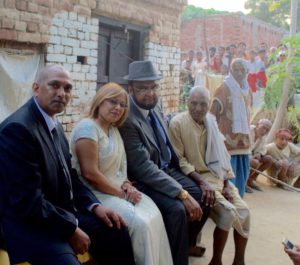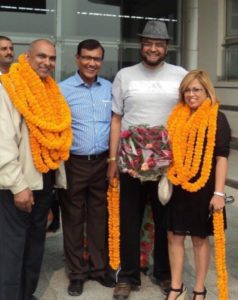
In 1902, Mahesh Ahir sailed on the Arno ship from India to British Guiana to work on the sugar plantation as an indentured labourer. Mahesh, who was 27 years old when he arrived in British Guiana, adapted to the local culture and learned the new language in that foreign land. Sadly, he never got the chance to return to his homeland. Knowing this, his descendants were prompted to trace their ancestral roots.
Rosie Rohini Prem, a Canadian born to Guyanese parents, was moved to search for her ancestors after her ‘aji’ Baichnee (grandmother) told her stories of her ancestors from India. She was told that her great grandfather, Mahesh, and great grandmother, Rampatia, were on board the Arno together. They fell in love and got married on arrival to British Guiana. They had three sons together.
In 2011, Rosie managed to get copies of immigration passes of her ancestors from the National Archives in Guyana. The immigration passes gave the name of her great grandfather, his caste, his father’s name (Bhikhari) and his home address in the village of Bibipur, Thana Karimuddinpur, District Ghazipur in Uttar Pradesh, India.

Rosie then made three trips to India to find her relatives and ancestral village, but failed to do so. It was only after she sought the help of Faiyaz Shafique Ansari, a total stranger who eventually became her “good friend”, and a resident of Darjeeling in India, that she was able to find the village and was reunited with her long lost kin – Prabhunath Yadav, Laxminia and Maturni, including cousins.
When Rosie initially visited Bibipur, she said she faced numerous challenges. The people there were not so welcoming. Despite these challenges, Rosie was determined in her search. She recollected offering them “pocket money for sweets” and they eventually divulged information about Bhikari (Mahesh’s father). The people told her that Bhikari’s name is chanted in the Hindu ritual of Pind Daan. She also learned that “one young man in his thirties from their family had left with the British and never returned again to his home”. Hearing this, Rosie felt reassured and “gained strength” that she was on the right path.
When Rosie and her husband finally arrived at Babatpur airport in India, they received a warm welcome by both her “near and far relatives”. She then travelled to Bibipur, where she met Prabhunath Yadav, his wife Laxminia and a “senior lady” named Maturni. They offered Rosie a place to stay in Bibipur and a portion of their land so that she can build a home in the village. Tears flowed down Rosie’s cheeks when she finally got to meet her relatives in Bibipur. It was, after all, the fulfilment of her long cherished dream – something she had been chasing after for a very long time.
Rosie mentioned that Bibipur is a very small, remote village that is populated mostly by the people of the Ahir caste. (The Ahirs, or Aheers, are said to have ruled over different parts of India and Nepal.)
Upon her arrival in the village, a ‘havan’ ritual was performed in the home of Mahesh. Rosie then placed a memorial plaque in memory of her great grandfather in the presence of her fourth generation relatives.
After much celebration in Bibipur and touring scenic sites, Rosie travelled to Kolkata to visit the port where Mahesh had embarked from in 1902.
Rosie mentioned that “the descendants of the girmitiya (indentured) workers are aware of the hardships of their ancestors as well as their roots”. She added that her “forefathers had taken Uttar Pradesh and India in their hearts after they were lured away to British Guiana in the name of a better life”.
According to her, the process of trying to find an ancestral village is not a simple search. However, with “determination and God’s favour”, her prayers were answered.
“I was so overwhelmed when I connected with my Indian roots for the first time. This prompted me to return to the village in December 2013, this time with my sister. My journey has shown me that with determination and faith are integral in being successful,” Rosie expressed.



